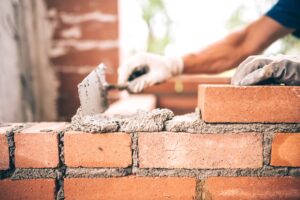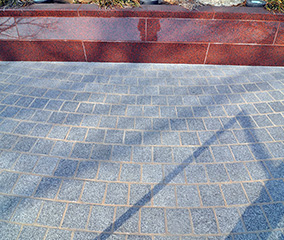
Learn more about the different types of mortar and which is best for your needs.
Mortar is the binding material that holds masonry structures together, and its type can significantly impact the durability and strength of a project. With various types of mortar available, each designed for specific applications, understanding their differences is essential for ensuring a successful masonry project. DelPrete Masonry can help you understand the common mortar types—N, O, S, M, and K—and their unique characteristics.
Type N Mortar: The All-Purpose Option
Type N is one of the most versatile mortar types and is commonly used for above-ground applications, such as walls, chimneys, and facades. It offers a balance of strength and flexibility, making it suitable for structures exposed to moderate weather conditions. Its compressive strength of approximately 750 PSI ensures durability while allowing slight movement without cracking.
Best for:
- Exterior walls
- Retaining walls
- Chimneys
Type O Mortar: The Low-Strength Option
Type O mortar is a low-strength option with a compressive strength of about 350 PSI. It is primarily used for interior applications where load-bearing strength is not a priority. Its softer composition makes it ideal for restoring historic masonry, as it allows for easy removal and minimizes damage to older bricks and stones.
Best for:
- Interior non-load-bearing walls
- Historic restorations
- Decorative applications
Type S Mortar: The High-Strength Option
Type S mortar is designed for load-bearing applications and is often used in structures exposed to severe weather conditions. Its compressive strength of approximately 1,800 PSI makes it highly durable and resistant to soil pressure and water penetration, making it popular for below-ground projects like foundations and retaining walls.
Best for:
- Foundations
- Retaining walls
- Pavements
Type M Mortar: The Super-Strength Option
Type M mortar boasts the highest compressive strength of all mortars, at about 2,500 PSI. It is ideal for heavy-load structures, such as retaining walls and foundations, that require maximum durability. However, its rigidity can make it unsuitable for more delicate applications, as it may crack if the structure shifts.
Best for:
- Foundations for large structures
- Stone masonry
- Retaining walls in high-load areas
Type K Mortar: The Specialty Option
Type K mortar is the least commonly used type with the lowest compressive strength, around 75 PSI. It is specifically designed for historic preservation projects, as it closely mimics the properties of the original mortar used in older buildings. This ensures the structural integrity of historical masonry is maintained while preserving its aesthetic appeal.
Best for:
- Historic restorations
- Delicate masonry
Choosing the Right Mortar for Your Project
Selecting the right mortar type depends on several factors, including the structure’s purpose, location, and materials. A professional mason can assess your project’s needs and recommend the appropriate mortar to ensure longevity and stability.
At DelPrete Masonry, we understand the importance of choosing the right materials for every project. Contact us today to learn more about how we can assist with your masonry needs and deliver results that stand the test of time.
CONTACT DEL PRETE MASONRY TODAY!
Whether you are ready to start your next masonry project or are still hesitant and have questions, Del Prete Masonry is here to help. We have the experience and expertise to get it right the first time. Questions? Want to visit some of our residential or commercial projects? Ready to set up a consultation? Feel free to give us a call at 410-683-0650 or visit us online. We are happy to serve Baltimore City and County, Harford County, Carroll County, Anne Arundel County, and Howard County. To see examples of our work and to keep up with our new and exciting projects, be sure to follow us on Facebook, Twitter, and Pinterest.
Tags: brick masonry, masonry, mortar, stone masonry





























